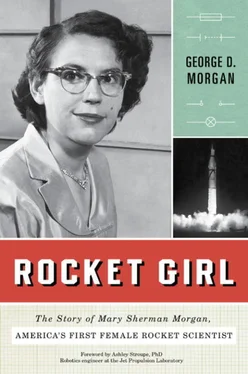“George—who does Mom remind you of?”
It was my sister Monica, calling from Stayton, Oregon—the town she had hitchhiked to as a teenager thirty years before. She had gone there to discover herself. Instead, she discovered rain. Monica knew I was starting work on the play. I had told her to call me if she had any ideas or could remember any pertinent details I could use.
“Think,” she said. “Who does mom remind you of?”
“What are you talking about?” Our mother had been dead for six months—she didn’t remind me of anyone except herself.
“Have you seen that show on TV?” Monica asked.
“What show?”
“ Monk . It’s a TV show about an obsessive-compulsive detective. Have you seen it?”
In fact I had come across a few episodes. Not much of a TV watcher, nothing had clicked. What was she getting at?
“What are you getting at?”
“We’ve wondered for years what mom’s problem was.”
“Yeah, so?”
“I want you to imagine,” she said. “Imagine the character of Monk without the funny—a Monk who’s been taken over by the dark side of the Force.”
I imagined it, and a light went on in my head.
“Yeah,” I said. “A dramatic Monk instead of a funny Monk. Could be.” I thanked her, and we hung up.
Was that her problem? Or perhaps I should say, was that her “condition”? Had Mary Morgan been obsessive-compulsive? I opened up a few websites and began studying the subject—a subject I knew nothing about. It didn’t take long to figure out that this very possibly was the source of her many odd behaviors over the years—behaviors that at times were downright scary. As I read and studied, one other characteristic of the disorder also became obvious: there was absolutely nothing funny about it.
But here was the strangest thing of all: during my interview with my father, Bill Webber, and other former coworkers, I had asked about her odd repetitive behaviors. I wanted to know what it was like to work with someone like that. I wanted to know how it had affected her work, or her working relationship with her fellow engineers.
Their reply: “I have no idea what you’re talking about.”
Which was very strange. From my earliest youthful recollections, a day never went by that I did not witness her symptoms, if that’s what they were. How could someone who worked next to her for years have missed them? I went back and re-interviewed my father on the subject; he still maintained the same reaction. This was a man who had been married to the woman for fifty-three years.
“I have no idea what you’re talking about.”
The house is cemetery quiet—the perfect environment to get some writing done. Have to get started. I need to get words on the page. I look at the digital clock in the lower right-hand corner of the monitor.
1:39 a.m.
All our lives we, the four Morgan kids, have been told the same your-mother-retired-to-raise-a-family story. But there are other things we have been told about her that have turned out not to be true. Does the retirement story fall into the category of Santa Claus and the Tooth Fairy? I’m beginning to wonder. I’m beginning to wonder if she was forced to retire from her top secret aerospace career because her OCD-like behaviors were becoming more pronounced and less self-controllable. People were fired all the time at North American Aviation for far less than that.
On this late evening as I struggle to get words on the page, I am fifty-two years old. Even now, many years later, I can still hear my mother grinding her teeth, mumbling to herself, and shuffling those cards.
I have no idea what you’re talking about.
One day, completely out of the blue, I get an e-mail from someone claiming to be a friend of Irving Kanarek. I had been searching for Kanarek for years, but no one knew his whereabouts. In the ’60s and ’70s Irving Kanarek would become famous for being Charles Manson’s defense attorney. But long before that career took off, Kanarek was a chemical engineer at North American Aviation and worked as my mother’s immediate supervisor. Based on his birth year, I had come to the conclusion that he must have passed away. But the lady who has e-mailed me says Irving heard about my play at Caltech and he wants to talk to me. Her phone number is in the e-mail, so I call her.
“Irving Kanarek is still alive!?” I ask, incredulous.
“Yes,” she says. “He just turned ninety, but he’s alive and living in a motel in Costa Mesa.”
Costa Mesa is a city in Orange County about forty miles south of Los Angeles. Since Irving was one of my mother’s supervisors at North American, it’s urgent I talk to him right away. The lady gives me his e-mail address and I fire him off a few sentences: Mr. Kanarek, you don’t know me, but you worked with my mother, Mary Sherman Morgan, at North American Aviation. I am writing a book about her life. If it wouldn’t be too much trouble I would like to sit down with you for a couple of hours and ask you some questions.
The next day he e-mails me his phone number and tells me to call him. I take a few hours preparing what I am going to say to the man who has become one of the most famous defense attorneys in history. I need the reception to be as clear as possible, so I eschew the cell phone and use a land line at my office. I want to keep a record of the conversation, so I hold the receiver in my left hand and hover a pen over a pad of paper with my right. My finger dials his number, and the line on the other end begins to ring. This was the conversation:
“Hello,” said a voice.
“Is this Mr. Kanarek?”
“Yes. Who is this?”
“This is George Morgan.”
“Did you get the bat?”
“The what?”
“The bat. Did you get the bat?”
“The bat? You mean, like a baseball bat?”
“Yeah. Did you get it?”
“I’m not sure…”
“The day you were born I went to visit you and your mom in the hospital. I brought you a present—a kid’s baseball bat. Did you get it?”
“Ummm…”
“Ask your dad—he knows about it.”
On the day of this conversation I am fifty-seven years old, but suddenly the image pops into my head. When I was very young, I had a small wooden bat, about half the size and weight of a regular bat. I always assumed my parents had bought it for me; they never said otherwise. It was the bat my father had me use when he first taught me how to hit a baseball. For a brief moment my mind tunes out the voice of Irving Kanarek and a long-ago memory of my father teaching me how to swing a bat pushes in to my conscious. I am about six years old, and we’re in the backyard of our house in Reseda.
“Hold the bat like this, son. Two hands firmly around the neck. Bring it back over your shoulder, then swing, like this.”
My dad and I both hold the bat, and he demonstrates how to swing it. Then he walks ten steps away and pitches me the ball, slow and underhand. I swing the bat, and miss. He pitches several more balls—I swing and miss every one. After a few more strikes, I throw the bat down in frustration.
“I can’t do this!”
My father walks back and gets down on one knee.
“I’m going to tell you a little secret about hitting a baseball, okay?”
I nod my head.
“The hard part about hitting a baseball is you’re trying to hit a round object with another round object. It’s difficult. But the more you know about the science of physics, the easier it is. In my job I use a lot of physics, so I can give you information few other fathers know about—understand?”
I nod my head.
“I’m going to tell you a secret about hitting a baseball, and you have to promise not to ever tell anyone else. Okay?”
Читать дальше












